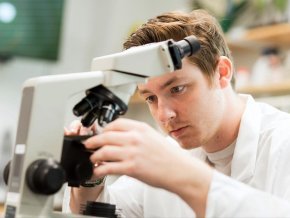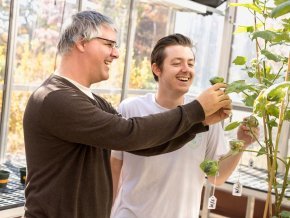
Seeing a future under the microscope

Growing up, Chase White ’23 knew he wanted to be a doctor. When he arrived at Lenoir-Rhyne, he quickly declared as pre-med with biology as his major and enthusiastically pursued his studies in science – leading him to a plant anatomy course that would ultimately change his path.
“It’s surprising. Now I’m leaning toward biomedical research,” he shared. “In these last two or three years, doing all this research, I think I want to continue and develop new technologies to help people.”
In the summer of 2021, White discovered his passion for research while working with Michael (Mike) Stiff, Ph.D., associate professor of biology, researching lab-based growing processes for cotton — think of the Impossible Burger, but with t-shirts – in cooperation with Massachusetts-based startup Galy Co.
“I took a plant anatomy and physiology course with Dr. Stiff and had started to gain interest in plants when he told us about this opportunity for an internship,” White explained. “In Lineberger Fellows [a university group that recognizes and prepares highly-motivated students for competitive post-graduate scholarships, fellowships, awards and exceptional employment opportunities], we’re taught to grab every opportunity that comes at us. So, I applied for it. I went through the interviews, and they hired me.”
Into the greenhouse and the laboratory
While cotton is in a variety of everyday items — from clothing to currency — it also consumes enormous amounts of water, land and labor to produce. Galy Co. approached Stiff and Lenoir-Rhyne in 2020 when the company was first looking for labs to collaborate with Galy’s vision of sustainable lab-produced textiles, which starts at the cellular level.

“They were looking for people with expertise in cotton and saw that I do research in this area. They reached out to ask if we could work together to study how cotton fibers grow in the lab,” Stiff said.
He assembled a team of interns – White and two additional undergraduate students — to assist with growing plants in the university’s McDougal Greenhouse and to support the research on cotton fiber cells.
“I was excited to have a student of Chase’s caliber interested in working with cotton. His work at the beginning, along with two other students, showed the company that they could have a highly productive relationship with Lenoir-Rhyne.”
White worked with cell suspension cultures, investigating the effects of different solutions and materials on samples sent from Galy’s labs. He devised ways to measure cell growth and photograph samples through the microscope.
“It was a really hands-off approach,” White said. “Galy worked with Dr. Stiff, and Dr. Stiff trusted us. Everyone had their own task, and we were working on our own. It made me consider changing my path from med school to full-time research.”
Worms and big pharma
Medical school isn’t completely out of the question for White, however. After months of working with the cotton plants, he elected to take an MCAT preparation course over the summer. “I’m still keeping my options open, but I didn’t want to spread myself too thin” he shared.
For White, his commitment to science weaves itself through his life. From his part-time job in a pharmacy to the organizations he is a part of, including Chi Beta Phi, the math and science honor society, and Seeds, an environmental club, and the Collegiate Academy of the North Carolina Academy of Science (CANCAS), where he is vice-president. Plus, he is a member of the Lenoir-Rhyne Honors Academy and is now president of the Lineberger Fellows.
“I really don't think I would have thrived at a bigger university because the one-on-one instruction and the connections that you form with your professors here just open up unlimited possibilities,” White reflected. “I also don’t know if I would have had access to so much hands-on research if I weren’t here.”
White has returned to the lab this fall, preparing his senior research project with Judy Moore, Ph.D., associate professor of biology. He will investigate how the drug methotrexate affects the California blackworm’s ability to regenerate.
“This research could be applied to a much larger scale with patients who have trouble healing from wounds,” White shared. “If they’re taking this medication, it could have an effect on healing. Methotrexate is used as an anti-inflammatory and an anti-cancer treatment because it keeps cells from multiplying. But in the case of an open wound, you want cells to multiply, so what do you do?”
With Moore’s oversight, White has designed his experiment, ordered the supplies, and prepared the procedures. He is eager for the supplies to arrive so the study can begin.
“I got to experience all these different things with the internship. I’ve gained a lot of skills and techniques, and I’ve learned how to use all kinds of different equipment. I feel confident doing this now.”

Lenoir-Rhyne University has selected Summer McGee, Ph.D, as the institution’s 13th president. Her appointment was enthusiastically approved by the Lenoir-Rhyne Board of Trustees after a national search.
View More
Lenoir-Rhyne University has announced that Brent Owen has signed a new three-year contract extension to remain as head men’s basketball coach through April 2028.
View More